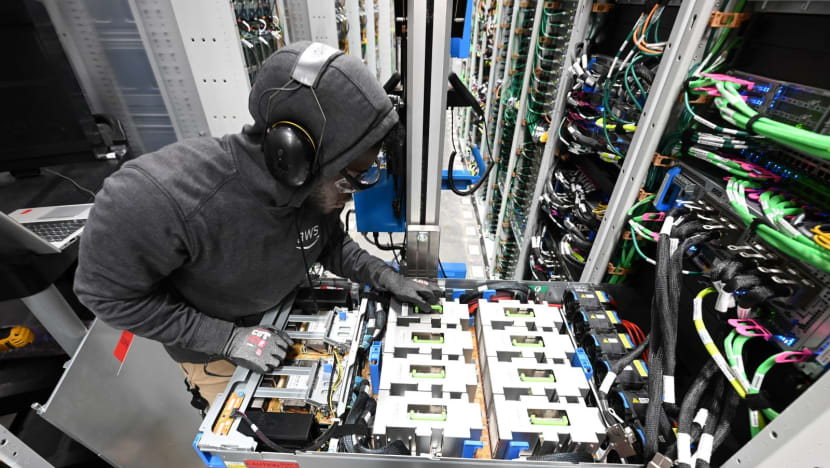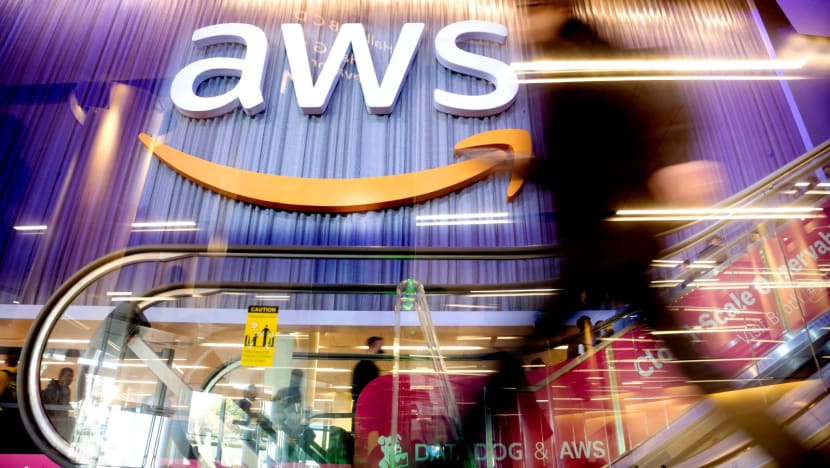Why security lies at the core of successful digital transformation
Amazon Web Services’ secure-by-design framework enables businesses to embrace innovation with confidence.

AWS’ security experts monitor the cloud 24/7 to help protect customer content. Photos: Amazon Web Services

This audio is generated by an AI tool.
As the founder of an education technology start-up, Mr Aditya Batura understands the importance of securing his company’s young users’ data and resources.
“Security should be a key consideration for companies of all sizes as it affects not just the business and its employees, but also its customers, in very impactful ways,” said the co-founder and CEO of Codomo, which aims to nurture design and computational thinking in children. “From day one, ensuring we stored data and secured systems to the highest standards was a major priority.”
SECURE-BY-DESIGN FROM DAY ONE
Amazon Web Services’ (AWS) cloud security made it possible for Codomo to efficiently and effectively achieve this goal.
“The security offered by the cloud helps us safeguard both hardware and software, ensuring that data and systems remain secure. This allows our staff to focus on growth and customer service, rather than worry about cyber threats,” said Mr Batura.

According to the Singapore Cybersecurity Health Report 2023, 99 per cent of organisations that experience a cybersecurity incident face adverse consequences to their business, including disruptions, data loss and reputational damage. Common cybersecurity threats include social engineering scams, ransomware, denial-of-service events and malicious actors taking advantage of software vulnerabilities.
Ms Annabel Lee, director of ASEAN Public Policy at AWS, said that this secure-by-design approach is necessary in the dynamic cybersecurity environment that businesses today operate in.
“AWS’ infrastructure has been built to satisfy requirements for organisations with the most stringent security needs, such as militaries and banks,” said Ms Lee. “Moving to the cloud enables businesses to implement essential security fundamentals and benefit from the robust security environment provided by our cloud technologies.”
Another benefit is having AWS’ team of security experts monitor the cloud 24/7 to help protect customer content. “We are able to notify our customers when suspicious activity is detected,” said Ms Lee. “That allows them to take quick action to protect their data and ensure uninterrupted services for their customers. Without the security features inherent in cloud services, including monitoring and support, cybersecurity breaches can go undetected for days, weeks or even months.”
EMPOWERING CUSTOMERS BY SIMPLIFYING SECURITY

Mr Batura, who is also the managing director of Digital Prosperity Asia, a coalition of businesses supporting Asia Pacific’s digital growth, regularly meets with founders of other start-ups and small- and medium-size enterprises (SMEs) from across Asia Pacific. Through his interactions with them, he noted that the security of cloud technologies has reduced the perception of cybersecurity as a complex and intimidating endeavour.
“Securing an organisation’s infrastructure is made much simpler thanks to the tools offered by the cloud,” he said. “Implementing features like multi-factor authentication is now more straightforward, as is maintaining visibility on environments in the cloud.”
AWS’ user-friendly interface – which offers over 300 tools for customers to secure their data – allows customers to see whether datasets are private or public, as well as monitor employee access to data and applications.
Additionally, AWS’ Shared Responsibility Model for security empowers customers to manage and secure the applications and data they build in ways that align with their business needs, while AWS takes on security of the cloud itself.
“AWS protects the physical and logical layers of the infrastructure, including hardware, software, networking and processes in data centres,” explained Ms Lee. “Our customers are responsible for the security of applications and data they build on our infrastructure.”
BUILDING A SECURE FOUNDATION FOR GROWTH AND INNOVATION
Mr Batura also supports his family’s maritime services firm, Sinoda Shipping, in various areas of digital transformation, including in the security domain. He noted that many SMEs are legacy companies grappling with the challenges of going digital.
“Some SMEs fear going digital because of cyber threats, which hinders their competitiveness,” he said. “Conversely, some organisations are unaware of the need for proper cybersecurity precautions even when using their own infrastructure. The cloud’s security features can help address both these issues.”
A common misconception is that the IT security is tied to the organisation’s physical location.
“Many company owners believe that having servers on-site makes them more secure,” observed Ms Lee. “However, bad actors can still gain access to systems via the Internet. This is why security must be a priority in every aspect of business, including its infrastructure, daily operations and culture. Being secure is about the security you apply to your systems, not where they are located.”
Many businesses in Singapore are already leveraging security features in the cloud, which will continue to be enhanced by technologies like artificial intelligence (AI).
“Advancements in AI will allow for easier automated monitoring of internal systems, while generative AI simplifies the communication of abnormal activity to security professionals,” said Mr Batura.
AWS supports customers in creating top-tier security infrastructure through resources like the AWS Well-Architected Framework, a comprehensive set of best practices for cloud applications. Additionally, AWS offers cloud security training, digital courses, self-paced labs and certifications to help foster a strong security culture within organisations and help create a more secure future for Singapore.
“It’s crucial to establish strong security hygiene and governance in organisations undergoing digitalisation,” said Ms Lee. “This is especially pertinent for SMEs, which comprise 99 per cent of companies and support 71 per cent of the jobs in Singapore. Ensuring these companies can grow, innovate and remain secure during digital transformation is a mission we must undertake together.”
Learn more about how security can be a core business enabler with Amazon Web Services.















